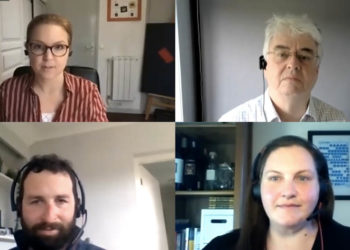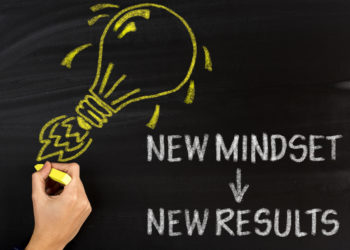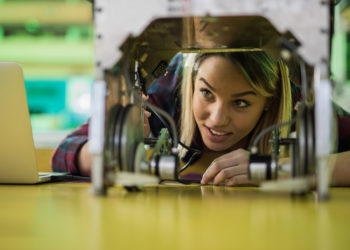Editor’s note: Today’s guest post, by Simon Holt, Senior Publisher at Elsevier, and Erin Osborne-Martin, Executive Society Partnership Manager at Wiley, is the first of two looking at the experiences of people with disabilities in scholarly publishing (the second will can be found here).
This year’s Society for Scholarly Publishing (SSP) Annual Meeting featured a session, The Glass Ceiling You Haven’t Heard About Yet, which focused on the experiences of people with disabilities in the publishing industry, and suggested steps organizations could take to become more disability confident. The Q&A included an interesting discussion on disability disclosure – whether and how a person with a disability should share this at work, both ‘officially’ and ‘unofficially’. This can be a tricky experience for both employee and employer – the employee naturally wants to focus on what they can do, rather than what they can’t do; good employers want to set their employees up for success, but don’t always know how. Bruce Rosenblum has also written eloquently about his own personal experience, and this article also summarizes the dilemma well. Following the discussion at the conference, we wanted to highlight some of the key issues in the scholarly communications industry.
In today’s and tomorrow’s posts, we share some personal examples from people with disabilities, taken from our own experiences, along with our suggestions for how scholarly communications organizations could be more inclusive. Today’s post is by Simon Holt (Elsevier) who is severely sight-impaired, and Erin Osborne-Martin (Wiley), who has a spinal cord injury. They focus on how disability affects applying for and interviewing for new roles. Tomorrow, Sylvia Hunter (Inera | An Atypon Company) and Katy Alexander (Digital Science) will look at job hunting with a disability in the publishing industry.

What considerations are there when deciding whether to disclose that you have a disability when applying for a job?
Erin: One of the advantages of having a visible disability is that I don’t have to think about whether or not to disclose my disability during the interviewing stages — I have a spinal cord injury and walk with crutches, so it would be impossible to hide at in-person interviews even if I wanted to. I also need to check in advance that the interview location is accessible, which is far from a certainty.
Simon: The biggest challenge here is not whether to explain, but how to explain: when you apply for a job, you really want to lead on what you can do, rather than what you can’t do. Job applications and interviews are about demonstrating to the hiring manager why you’d be a great fit for the job. It’s not ideal if your first interaction with your potential boss-to-be is all about what you can’t do, or how the job will need to be adapted so you can do all of it. There’s always the concern: what if success at an interview depends on a task, like a proofreading test, that I can’t even begin? This has happened to me more than once, and it’s so frustrating, particularly when I have later found out the proofreading test was simply to assess ‘general publishing skills’ and would not even be a part of the role itself.
For me, being severely sight-impaired, my disability is ‘hidden’ in that I don’t ‘look different’, but I know I will need the support of my employer if I’m going to be able to do my job properly. If a job description requires, for example, ‘an eye for detail’, or ‘must be able to regularly travel internationally’, there are issues I need my employer to be aware of, otherwise it is going to be an unhappy experience for both of us. The reality is that I can’t learn to proofread efficiently, or to read name badges at conferences, in the same way that I can learn Excel or go on a coaching course. I certainly don’t want to start off my relationship with a potential employer with a falsehood, so it’s better to be open from the start, even if that requires some vulnerability and bravery.
What disability-related barriers have you faced when applying for or starting roles?
Erin: I tend to meet a lot of different people in the course of my work, and they’re unfailingly polite and respectful about my disability. And my employer has been excellent about arranging a range of accommodations to enable me to continue working at full capacity. But unconscious biases and ableist work cultures across the industry become apparent in a variety of ways, and disabled interviewees are particularly attuned to signs that a workplace may not be fully welcoming to them. A disabled friend told me about a video interview she had with a publishing industry startup, where her normally visible disability was hidden. The interviewers were enthusiastically telling her about their company-wide retreat featuring rock-climbing, early morning yoga, and a 10k race. On their website, the employees skewed heavily young, white, and male (something of an anomaly in publishing, given that 64% of employees in publishing are women). My friend removed herself from consideration for the role and declined to attend a second, in-person interview.
In a similar vein, I’ve been asked if I’m able to handle traveling for roles I’ve applied for. All of my publishing roles have included extensive travel, and when I choose to apply for a job that specifies travel is part of the role in the job description, I’m making a conscious and informed decision about my ability to perform that role. Of course, the truth is that travel is more of a challenge these days than it was before my injury, but over the past four years I’ve become quite adept at booking assistance for trains and flights, and calling hotels multiple times to ensure rooms are actually accessible and not just advertised as such. I enjoy conference travel and find the in-person networking it offers rewarding. I’m able to make the choice for myself in trading off some fatigue for the upside of making new and interesting connections. Assuming that I’m unwilling or unable to travel just because I’m physically disabled reveals an unconscious bias that many people hold towards disabled people.
There’s an excellent recent TikTok video by user @leftyonhardmode, who talks about how he uses a keyboard as a right-hand amputee. He works as a programmer, and he mentions that companies he’s interviewed for have asked him to do a typing test — which he refused. As he points out, typing speed isn’t a rate-limiting factor for coding; a typing test wouldn’t accurately reflect his abilities as a programmer, and in any case he is a perfectly competent typist. The video ends with a simple “Maybe don’t make assumptions about what I can do, huh?”.
Simon: Luck has a big part to play in most careers and mine is no exception. I struggled during the early part of my career, partly because the kinds of roles I was doing involved either systems or tasks I found challenging due to my low vision, and partly because societal knowledge and understanding about disability and accessibility was not at the same level then as it is today. Specifically, neither I nor my colleagues were really aware of what help (software and otherwise) was available, and I don’t think anyone (including myself) knew how to raise the issue with confidence. Sometimes I think that as a society we are so worried about saying the wrong thing that we don’t say anything at all, which means that problems don’t get solved – a lack of confidence on behalf of both me as the employee and my colleagues to raise issues meant small fires became big ones. They were worried about causing offense and I was worried about admitting I was struggling. Whilst societal focus on diversity, equity, inclusion, and accessibility (DEIA) has improved the situation a bit, this remains a problem, particularly for early-career professionals who may still be getting used to a work environment. We need to push past this if we are going to make real progress, and unlock the potential of the 15% of our workforce with disabilities.
On the flip side, in 2013 I was lucky to be hired by someone at Elsevier whose daughter is visually impaired, and that was when my career trajectory changed. She was the first person in my professional career who ‘got it’, and knowing that she understood some of the challenges I would face gave me the confidence to take the job, and to ask for the help I need. I’m not saying everything has been plain sailing since – life simply isn’t like that – but knowing I wasn’t on my own made a huge difference. It allowed me to focus on work for a change and, therefore, to really succeed in my professional career for the first time. This shows what good allyship can achieve.
How has having a disability affected your approach when applying for a job?
Erin: I have an acquired disability, which means that I know what my own attitudes were towards disability and disabled people before I became disabled myself. I certainly thought of myself an ally and was supportive of greater access and better rights for disabled people, but at the same time, I was completely unaware of my non-disabled privilege and of my own unconscious biases around disability. This isn’t a finger-wagging piece, designed to tell able-bodied people that they should stop enjoying activities that disabled people can’t join in, or that you should be scared to ask genuine questions. But potential employees are more aware of the importance of work culture than ever before. According to Deloitte, 67% of job-seekers said that a diverse workforce is an important factor in evaluating potential employment opportunities, accepting job offers, and staying aboard once employed. In a more recent whitepaper from the Robert Walters Group, 90% of job-seekers have researched the culture of a company before accepting a job and 73% of employees have left jobs due to a poor culture fit. Disabled employees are likely to be particularly sensitive to signs that a workplace may not be accommodating or welcoming, because many of us have previously experienced some form of discrimination in our work lives.
Simon: I definitely assess my potential manager differently when considering job moves than I would if I didn’t have a disability. Most people are thinking, ‘What’s their management style like? Are they a micro-manager? How will they help develop me?’ For me, the questions are, ‘Will they look after me? Will they fight for me? Can I be vulnerable with them when a disability-related problem inevitably arises, or they ask me to do something I can’t because of my vision?’ That changes the dynamic enormously, meaning the manager can sometimes feel more like a parent than a colleague. This not only makes it harder to move roles when you’ve found someone who ‘gets it’, but also can impede the autonomy of the employee in their existing role.
Do you have any advice for organizations looking to make their hiring processes more disability inclusive?
Erin: I would say the following would help make interviews more inclusive to disabled employees:
- Be clear on whether your normal interview location is accessible and, if not, make sure you know of one or more accessible locations nearby where you could hold an interview if needed
- Be prepared for questions about workplace culture, and think in advance about how you would describe that workplace culture to new employees. Is there anything that might be alienating to someone who is disabled? (This is also a useful exercise for all forms of diversity, equity and inclusion.)
- Be ready to think through and challenge your own assumptions and internal biases. Take a moment before assuming that someone might not be able to fulfill the requirements of a role due to their disability.
Simon: Accessibility is a big part of our industry today, and that means accessible policies and practices, as well as job platforms. There are good examples of companies who are proactive in this space. Microsoft, for example, see the benefit of hiring people with a disability. Where possible, it may also be a good idea to take the ‘disability’ part of the hiring process out of the hands of the line manager. This allows the employee to speak with someone specifically about their disability needs, while conversations with the hiring manager can focus entirely on the job itself. This would also bring consistency on issues such as flexible working and specialist software/equipment. The UK’s Reasonable Adjustment Passports are another good way of handling this.
Discussion
2 Thoughts on "Some Perspectives on Disability Disclosure in the Publishing Industry"
Thankyou for publishing this very important article. Awareness needs to grow within the industry – that a huge talent pool is being ignored, forgotten, or put off applying for jobs and promotions within publishing.
I remember getting feedback from an interviewer that I was “unfocussed”. The reality was, I am a walking stick user, and I had hidden the stick, folded, in my bag for the interview, and I was worried about how I’d walk the length of the room after the meeting, without disclosing my mobility disability ! There is so much prejudice, it makes me sad.
There are some wonderful points made in both these articles. I am sorry to read of Mary’s experience above and agree, it is time things change for the better. I am blind and about to join Taylor & Francis. I must say, the process from interview until now, just two weeks shy of starting, has left me feeling very positive – if still a little nervous!
I found T&F to be extremely warm and welcoming at interview and beyond. They have, so far, been very open to discussing with me, my disability and any adaptations I may need.
Of course, I am so aware of my need to “hit the ground running” and, as Mary says above, I feel a sense of sadness, that I already feel I need to prove my value, even more than anyone else would. This does not come from T&F or their treatment of me, as they have been wonderful so far. However, when you have a disability, it is easy to feel you are starting from behind – even if that couldn’t be further from the truth.
I call this the “tortoise paradigm” and it can only be altered by the passage of time and by a significant change of attitude in society.


